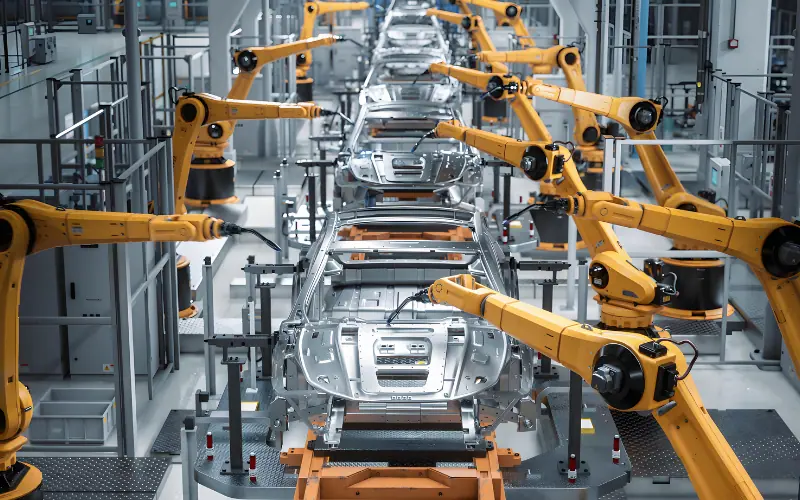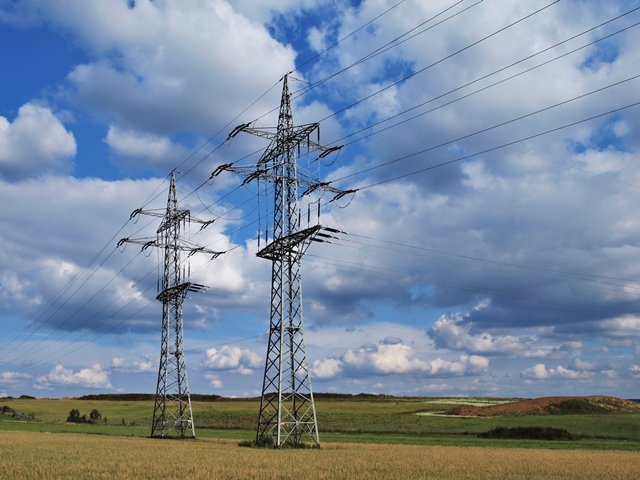Iron is considered one of the most important materials in modern industries and an indispensable element in many vital sectors that shape the global infrastructure and economy.
1. Construction Sector

Iron serves as the cornerstone of the global construction industry and plays a pivotal role in shaping the infrastructure of modern civilization. It is extensively used in the manufacturing of structural frameworks, bridges, high-rise towers, tunnels, and support systems for large-scale facilities such as stadiums, airports, and industrial complexes. The strength-to-weight ratio of steel (an alloy primarily made of iron) makes it ideal for supporting massive loads while maintaining structural flexibility and resistance to environmental stressors such as wind, earthquakes, and corrosion.
From reinforcing bars (rebar) in concrete foundations to pre-fabricated steel beams in skyscrapers, iron-based materials ensure stability, safety, and longevity in architectural designs. Additionally, advancements in steel technology—such as weathering steel and high-performance alloys—have further enhanced its application in modern sustainable construction, enabling faster building processes and longer-lasting structures.
Due to these attributes, iron remains the material of choice for engineers and architects who prioritize durability, efficiency, and economic viability in both residential and commercial construction projects.
2. Automotive Industry

In the world of automotive manufacturing, iron—most notably in the form of steel—plays a fundamental role in ensuring the safety, durability, and performance of vehicles. Steel is widely used in the production of car frames, chassis, body panels, suspension components, engine blocks, and braking systems. Its high strength-to-weight ratio, combined with excellent impact resistance, makes it an ideal material for withstanding collisions and protecting occupants during accidents.
One of the key advantages of using steel in the automotive sector is its formability. It can be easily molded and pressed into complex shapes, allowing manufacturers to design aerodynamic, lightweight, and structurally sound vehicle bodies without compromising safety. High-strength steels (HSS) and advanced high-strength steels (AHSS) have revolutionized modern car design, offering superior crash performance while helping to reduce overall vehicle weight, which in turn improves fuel efficiency and reduces emissions.
Moreover, the use of iron-based components in engine manufacturing ensures long-term reliability and thermal stability. Cast iron, for instance, is often used in engine blocks and cylinder heads due to its excellent heat retention and wear resistance. As automotive technology evolves—with a growing emphasis on electric and hybrid vehicles—steel remains indispensable for battery enclosures and structural reinforcements that require both strength and protection.
Ultimately, iron and its alloys continue to be at the core of automotive innovation, providing the balance between performance, safety, cost-effectiveness, and environmental responsibility.
3. Industrial Sector

Iron is a foundational material in a vast array of manufacturing industries, where it plays a crucial role in the production of machinery, heavy equipment, tools, and automated production lines. Its mechanical strength, durability, and workability make it ideally suited for withstanding the demanding conditions of industrial environments, where high loads, repetitive motion, and long operational hours are the norm.
In the manufacturing of heavy-duty machines—such as presses, lathes, conveyors, cranes, and excavators—iron and its alloys (particularly cast iron and steel) are favored for their ability to endure intense mechanical stress without deforming or failing. Cast iron, for example, is widely used in machine bases and components for its excellent vibration damping, which enhances precision and prolongs machine lifespan.
Iron also plays a vital role in the fabrication of tools and dies used in shaping other materials, including cutting, drilling, and forming equipment. Its machinability allows for precise engineering, ensuring that industrial parts meet tight tolerances required for high-performance systems.
Furthermore, in modern automated manufacturing environments, production lines often incorporate iron-based frames, rollers, supports, and joints that allow for seamless operation and structural integrity. The smoothness of steel surfaces helps reduce friction and wear, enabling more efficient movement of materials and components across production systems.
With the ongoing advancement of robotics, smart manufacturing, and industrial automation, iron remains a core material that supports innovation, productivity, and reliability in nearly every facet of the industrial landscape.
4. Energy and Infrastructure

Iron plays an indispensable role in the development and maintenance of critical infrastructure systems that support the functioning of modern cities and communities. Its application spans a wide range of essential utilities, including the construction of oil and gas pipelines, power transmission towers, water reservoirs, and structural components of energy plants.
In the oil and gas industry, iron—particularly in the form of steel—is the primary material used in manufacturing pipelines that transport crude oil, natural gas, and refined products over vast distances. These pipelines require exceptional strength, pressure resistance, and corrosion protection, all of which are key characteristics of steel alloys engineered for harsh environments, both above ground and underground, and even under the sea.
Similarly, power transmission towers that carry high-voltage electricity across regions are typically constructed from galvanized steel. These towers must endure extreme weather conditions, mechanical loads, and long-term environmental exposure. The durability and high tensile strength of iron-based materials ensure that these critical structures remain stable, safe, and reliable over decades of service.
Iron is also fundamental in water infrastructure. Steel and cast iron are used in the fabrication of large water tanks, pipelines, and pumping systems that store and distribute clean water to urban populations. Their ability to resist rust and pressure variations is vital for maintaining public health and efficient utility management.
In renewable energy sectors, such as wind and solar, iron is increasingly used in the supporting structures of wind turbines, solar panel mounts, and energy storage facilities. Its structural integrity ensures the long-term viability of sustainable energy projects.
Overall, iron is the backbone of infrastructure projects that power, sustain, and connect modern societies. Its versatility, strength, and cost-effectiveness make it a material of choice for building resilient cities and supporting the growing demands of urban development and energy consumption.
5. Home and Commercial Industries

From everyday electrical appliances to durable metal furniture, iron plays a significant role in shaping the products and environments we interact with on a daily basis. Its presence in both domestic and commercial settings highlights the material’s unmatched versatility, reliability, and functional value.
In the home, iron and its alloys—particularly stainless steel and cast iron—are widely used in the manufacture of kitchen appliances such as ovens, refrigerators, microwaves, and washing machines. These appliances rely on iron-based components not only for their structural integrity but also for their resistance to heat, wear, and corrosion. Stainless steel, for example, is favored for its sleek appearance and ease of cleaning, making it a popular choice for modern kitchen surfaces, sinks, and utensils.
Iron is also fundamental in the creation of cookware, including pots, pans, and grills. Cast iron cookware is known for its excellent heat retention and even heat distribution, making it a preferred option among professional chefs and home cooks alike.
Beyond the kitchen, iron is extensively used in furniture manufacturing—ranging from bed frames and chairs to office desks and shelving units. Metal furniture crafted from wrought iron or steel offers strength, longevity, and aesthetic appeal, often combining elegance with industrial design.
In commercial spaces, such as offices, restaurants, and retail stores, iron is used in fixtures, display units, security systems, and structural elements that demand durability and stability. It is also an essential material in HVAC systems, elevator structures, and other building services that contribute to comfort and functionality in modern environments.
Ultimately, iron’s presence in the products we depend on every day underscores its essential role in both form and function—enhancing quality of life while meeting the practical needs of contemporary living and business.
📌 In conclusion:
At Masto Steel, we believe in the importance of providing high-quality iron products that meet the needs of various industrial sectors. We always strive to be a reliable partner in developing infrastructure and industries in our region.
